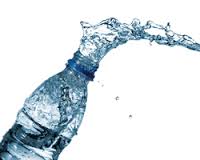Proper Hydration to Avoid Dehydration
June 9, 2016

In case you didn’t already know, every cell, tissue and organ in your body depends
on water to work correctly. The body needs water to maintain temperature, remove waste, and lubricate joints. Water is necessary for basic survival and good health. Which means, proper hydration is a must and dehydration risks, such as increased activity or exposure to high temperatures, without replenishing fluids can be dangerous.
Approximately half of our body weight is water that needs constant replacement as you sweat, go to the bathroom and even breathe throughout the day. When the weather is hot (and when you have a fever) water is lost even faster. Vomiting and diarrhea can lead to rapid water loss as well.
When the body doesn’t have enough water it becomes dehydrated. Ideally a person should have a readily available supply of water and intake throughout the day. If you’re thirsty, your body is already in the early stages of dehydration.
A few symptoms of dehydration include:
- dry mouth
- fatigue
- extreme thirst
- no tears when crying
- confusion
- headache
- little or infrequent urination
- dizziness or lightheadedness
Some people are at higher risk of dehydration. For example, high intensity workouts, certain medical conditions, sickness and lack of availability to clean water, are reasons why people become dehydrated. And, as you age, your brain may not sense dehydration as well and send signals for thirst.
If you are outside in extreme temperatures, pregnant or breastfeeding, trying to lose weight, vomiting, experiencing fever or have certain medical conditions such as kidney stones or bladder infections, it’s very important to drink plenty of water.
The recommendation for most people is to drink 8 glasses of water a day, but there is some variation depending on multiple factors. Mark your water intake for a week and the color of your urine. If it is colorless or light yellow at all times, chances are you are getting enough water. If it is dark yellow or amber colored, consider drinking more water each day the following week and then check it again.
Tips for staying hydrated:
- Carry a reusable water bottle (stainless steel or glass to reduce waste). Many places have water fountains to make refills easy and free.
- Drink water before, during and after your workout.
- When you’re hungry, drink water before you eat.
- If you have trouble remembering to drink water, try a schedule. For example, have 1-2 glasses of water upon waking and before each meal or drink a little bit every hour on the hour.
Water is best consumed in it’s simple form, but can also include flavorings like lemon and lime or cucumber and mint. And, decaffeinated beverages, fruit juices and some foods contain enough water to help avoid dehydration.
Signs of dehydration vary. Severe dehydration can lead to more severe symptoms such as excessive thirst, lack of sweat production (leading to overheating), low blood pressure, rapid heart rate, fever, fainting, sunken eyes and shriveled skin.
If dehydration becomes severe enough, IV hydration can become necessary. As the temperature heats up on Central Texas it’s even more important to pay attention to your hydration to avoid becoming dehydrated. If you or someone you’re with experiences severe hydration and needs medical attention our clinics are open seven days a week. And, as always, if you have any questions on how hydration or dehydration, feel free to come in and see us. We’d be happy to help.




